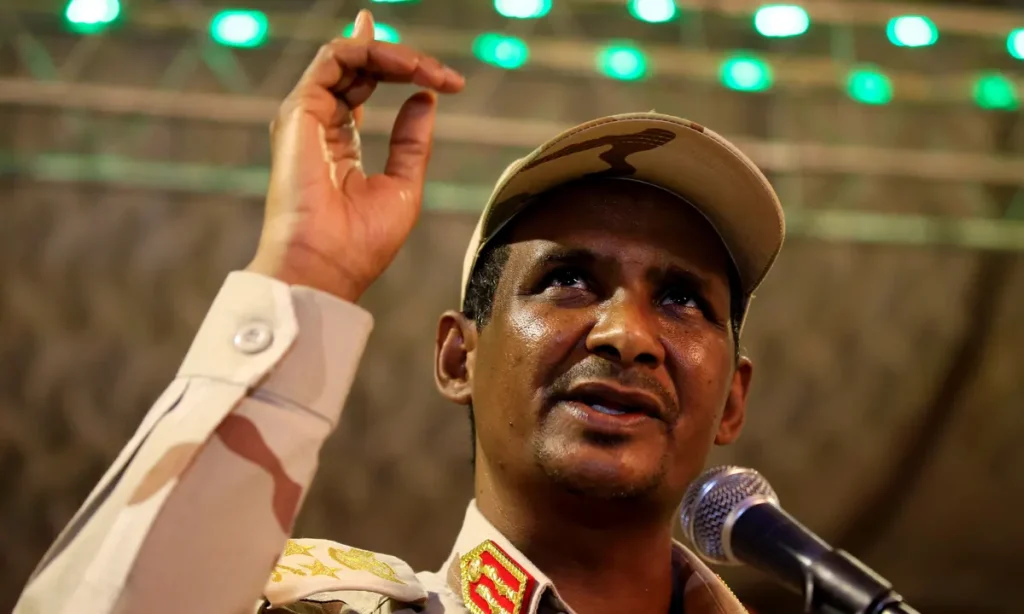Lieutenant-General Mohamed Hamdan Dagalo, commonly known as “Hemedti,” the Commander of Sudan’s Rapid Support Forces (RSF), revealed that he engaged in a discussion with UN Secretary-General Antonio Guterres regarding the complex situation in Sudan.
Using his social media platform, Hemedti conveyed to the public that he provided the Secretary-General with a comprehensive overview of the current events, underscoring the grave violations committed by Burhan’s coup militia against innocent civilians.
He expained that these transgressions encompassed aerial bombings, targeted killings, ethnically motivated arrests, hindering humanitarian organisations from delivering aid, and imposing constraints on aid workers.

Detailing his strategy to quell hostilities, Hemedti proposed initiating negotiations that tackle the root causes of the crisis. The ultimate goal, he explained, is to reconstruct the Sudanese state on new, equitable foundations that ensure security, stability, and a lasting, comprehensive peace. He expressed optimism about the appointment of Ramtane Lamamra as the UN Special Envoy in Sudan, emphasising his unwavering commitment to collaboration with him and all UN agencies to address the dire humanitarian situation faced by civilians under RSF control.
Meanwhile, President Ismail Omar Guelleh of Djibouti, leading the Intergovernmental Authority on Development (IGAD), has called for an urgent summit in Uganda on January 18 to address both the Sudanese situation and the Ethiopia-Somalia dispute. This follows an unsuccessful mediation attempt at the 41st IGAD summit last December between Hemedti and Sudanese Armed Forces (SAF) leader Abdulfattah al-Burhan.
Assistant Commander-in-Chief of the Army, Lieutenant-General Yasser al-Atta, cautioned against the political backers of the RSF, referencing them as Janjaweed and citing their potential to incite a civil conflict. He reassured officers at the Wadi Seidna airbase about the army’s inclusive composition, representing all Sudanese tribes, and dismissed concerns of an impending civil war.
Moreover, recent military operations between the SAF and RSF resulted in 33 casualties in Khartoum. Despite international pressure to return to the negotiating table, clashes escalated between the warring factions in various regions. Emergency Lawyers, a nonprofit volunteer human rights group, reported on social media that army artillery shelling in the Soba area claimed 23 civilian lives and caused numerous injuries. In Nyala, the west, army aircraft targeted multiple sites, resulting in dozens of deaths and injuries among civilians. RSF has maintained control of the city since October.
In eastern Sudan, the army reported repelling an RSF attack on Umm al-Qura, aiming to expand control towards Gedaref state. Fierce clashes also erupted in Wad Madani between the two sides.
Citizens reported witnessing heavy shelling near the First Infantry Division headquarters and the Enqaz neighbourhood near the Hantoub Bridge. They noted the exchange of intense fire, leaving residents confined to their homes. Members of the renowned “resistance committees” confirmed civilian casualties, though the exact numbers remained uncertain amid ongoing clashes.
Additionally, the National Umma Party condemned the violence in Dilling, south Kordofan state, between military factions and tribes. Warning of potential sedition and war, the party urged restraint among Nuba and Hawazma Arab residents. It called on the army and RSF to heed the “voice of reason and wisdom” to end the conflict, appealing to the Sudan People’s Liberation Movement led by Abdel Aziz al-Hilu to help contain the situation and prevent tribal strife in the Dilling region.


